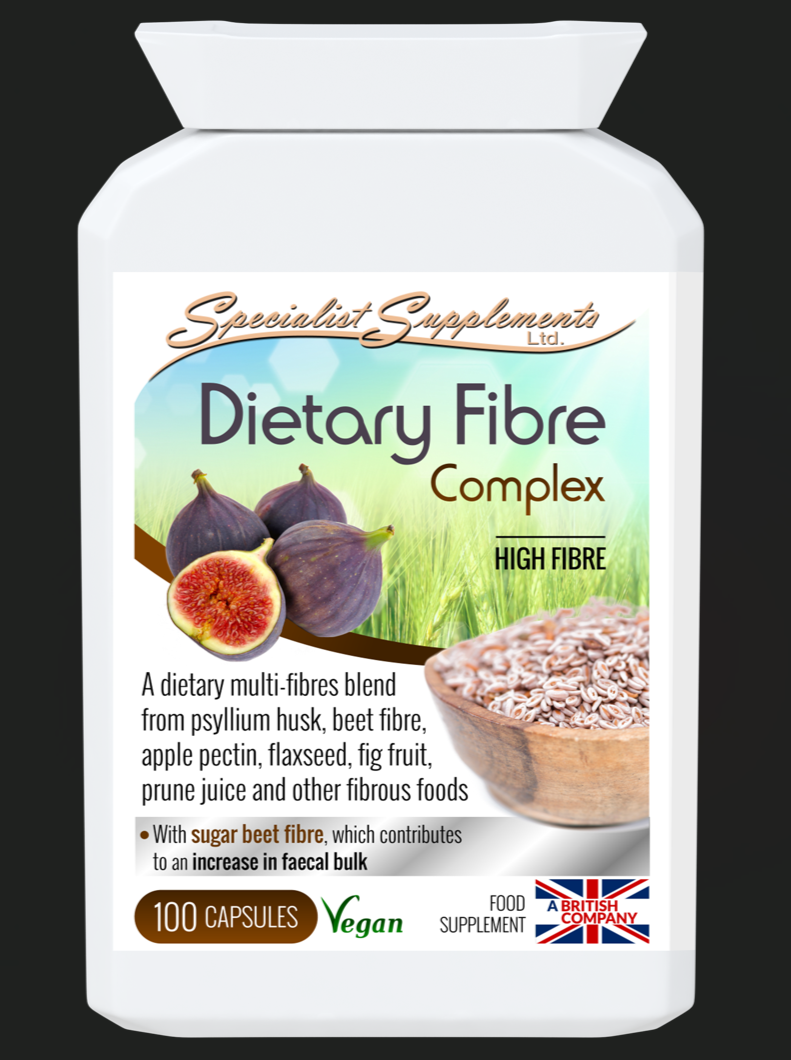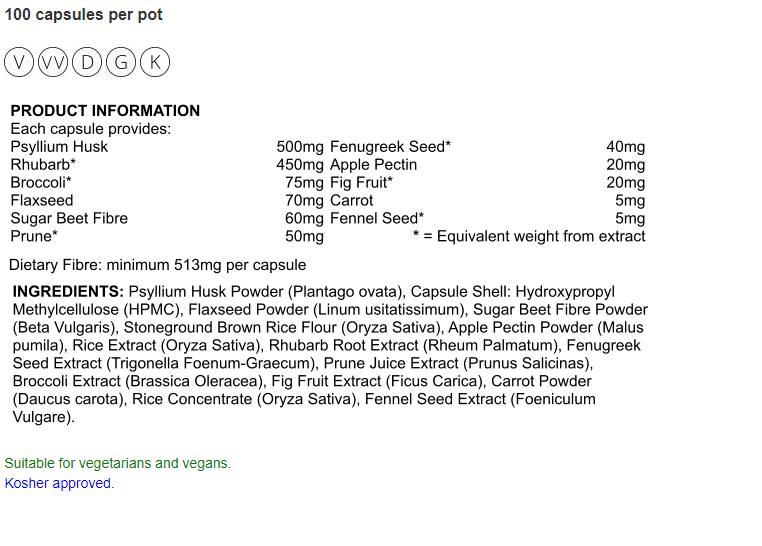1
/
of
3
Gentlemen's Oasis
Dietary Fibre Complex
Dietary Fibre Complex
Regular price
€20,00 EUR
Regular price
€50,00 EUR
Sale price
€20,00 EUR
Unit price
/
per
Taxes included.
Shipping calculated at checkout.
Couldn't load pickup availability
Dietary fiber is an important component of a balanced diet and can play a role in weight management, but it's not a magic solution for weight loss on its own. Including an adequate amount of dietary fiber in your diet can have several benefits that may indirectly support weight loss:
1. **Satiety:** High-fiber foods tend to be more filling and satisfying. They can help you feel full for longer periods, which may reduce overall calorie intake by curbing overeating or snacking between meals.
2. **Slow Digestion:** Fiber-rich foods take longer to digest, which can help stabilize blood sugar levels and prevent rapid spikes and crashes in energy. This may help control hunger and reduce the tendency to consume excess calories.
3. **Low Calorie Density:** Many high-fiber foods, such as fruits, vegetables, and whole grains, are relatively low in calories while providing bulk. This can allow you to eat larger portions of food without consuming excessive calories.
4. **Gut Health:** Dietary fiber supports a healthy gut microbiome, which has been linked to various aspects of overall health, including weight management.
5. **Regular Bowel Movements:** Adequate fiber intake promotes regular bowel movements, which can help prevent bloating and discomfort that might discourage healthy eating habits.
However, it's important to note that the effectiveness of dietary fiber for weight loss depends on how you incorporate it into your overall diet and lifestyle. Here are a few key points to consider:
1. **Variety:** Focus on a diverse range of high-fiber foods, including fruits, vegetables, whole grains, legumes, nuts, and seeds. A diet rich in a variety of fiber sources is more likely to provide the health benefits you're seeking.
2. **Hydration:** Adequate water intake is essential when consuming high-fiber foods, as fiber absorbs water and can help prevent digestive discomfort.
3. **Balanced Diet:** While dietary fiber is beneficial, it should be part of a balanced diet that includes a mix of macronutrients (carbohydrates, proteins, fats) and micronutrients (vitamins, minerals) to ensure overall health and proper nutrition.
4. **Physical Activity:** Incorporating regular physical activity is crucial for successful and sustainable weight loss.
5. **Realistic Expectations:** Dietary fiber can be a supportive element in a weight loss journey, but it's not a standalone solution. Sustainable weight loss requires a combination of factors, including a calorie-controlled diet, physical activity, and healthy lifestyle habits.
6. **Consultation:** If you're considering significant dietary changes or if you have specific health concerns, it's advisable to consult with a healthcare professional or a registered dietitian to ensure that your approach is safe and tailored to your individual needs.
In summary, dietary fiber is indeed beneficial for weight management due to its satiety-promoting effects and other health benefits, but it should be part of a comprehensive approach to weight loss that includes a balanced diet and lifestyle modifications.
1. **Satiety:** High-fiber foods tend to be more filling and satisfying. They can help you feel full for longer periods, which may reduce overall calorie intake by curbing overeating or snacking between meals.
2. **Slow Digestion:** Fiber-rich foods take longer to digest, which can help stabilize blood sugar levels and prevent rapid spikes and crashes in energy. This may help control hunger and reduce the tendency to consume excess calories.
3. **Low Calorie Density:** Many high-fiber foods, such as fruits, vegetables, and whole grains, are relatively low in calories while providing bulk. This can allow you to eat larger portions of food without consuming excessive calories.
4. **Gut Health:** Dietary fiber supports a healthy gut microbiome, which has been linked to various aspects of overall health, including weight management.
5. **Regular Bowel Movements:** Adequate fiber intake promotes regular bowel movements, which can help prevent bloating and discomfort that might discourage healthy eating habits.
However, it's important to note that the effectiveness of dietary fiber for weight loss depends on how you incorporate it into your overall diet and lifestyle. Here are a few key points to consider:
1. **Variety:** Focus on a diverse range of high-fiber foods, including fruits, vegetables, whole grains, legumes, nuts, and seeds. A diet rich in a variety of fiber sources is more likely to provide the health benefits you're seeking.
2. **Hydration:** Adequate water intake is essential when consuming high-fiber foods, as fiber absorbs water and can help prevent digestive discomfort.
3. **Balanced Diet:** While dietary fiber is beneficial, it should be part of a balanced diet that includes a mix of macronutrients (carbohydrates, proteins, fats) and micronutrients (vitamins, minerals) to ensure overall health and proper nutrition.
4. **Physical Activity:** Incorporating regular physical activity is crucial for successful and sustainable weight loss.
5. **Realistic Expectations:** Dietary fiber can be a supportive element in a weight loss journey, but it's not a standalone solution. Sustainable weight loss requires a combination of factors, including a calorie-controlled diet, physical activity, and healthy lifestyle habits.
6. **Consultation:** If you're considering significant dietary changes or if you have specific health concerns, it's advisable to consult with a healthcare professional or a registered dietitian to ensure that your approach is safe and tailored to your individual needs.
In summary, dietary fiber is indeed beneficial for weight management due to its satiety-promoting effects and other health benefits, but it should be part of a comprehensive approach to weight loss that includes a balanced diet and lifestyle modifications.
Share






